- Home
- Clive Barker
Tortured Souls: The Legend of Primordium Page 4
Tortured Souls: The Legend of Primordium Read online
Page 4
Montefalco grabbed hold of the tapestry. As he did so, Camille named the thing—
“Venal Anatomica.”
The General pulled the tapestry off and revealed it.
As might have been guessed from its scale beneath the carpet, it was of heroic size, nine feet tall or more. It had death’s face, and was equipped with a variety of medieval murder weapons. There were nails crudely hammered into its shoulder and leg. Blood had coagulated around the nails, but when Anatomica began to move (as now it did) fresh blood bubbled up from the wounds and ran down his body.
“Does it know me?” the General asked.
“Yes,” said Camille, “it is ready to obey your instructions.” Talisac spoke, and Camille translated. “He says he has no loyalty to its Creator, only to you, General Montefalco.”
“That’s good to hear.”
Montefalco beckoned to it.
“Come on then.”
The creature made a hesitant step. Then another.
“Can I come with you?” Camille said.
Montefalco looked down at her nakedness. “Only if you cover yourself up,” he said.
She smiled, and then went away to fetch herself a flea-bitten fur coat.
They went out into the night together: the three of them. The General, the Dwarf and Venal Anatomica.
Daybreak wasn’t far off. Neither was the end of certain things. Though Greta Sabatier had been killed by the bandits on the road to Calyx—a fate she had not foreseen—she had been right about that much. An age was coming to an end: and it was the Age of Lovers.
I
In his bunker of dirt and corpses Talisac waited alone, while his body—which was a thing without precedent—twitched and jumped and spasmed.
There was a child inside of him; the Mongroid, the infant of the Second Coming. Or so he’d come to believe, after the years he’d spent experimenting upon others, and himself. It wasn’t until he had created an homunculus that would be to all intents and purposes his child, its flesh made up of the same DNA as his, that he had come to believe there was something holy in the imminent arrival. It was another Virgin Birth.
In only a matter of hours now, the child would be in his arms.
He would have no one to share the triumph of what he’d achieved, but so be it. He’d been alone all his life, even in the company of his fellow human beings. Alone with his ambition, alone with his failures, alone with the strange dreams that came to find him in the middle of the night; dreams of his child, speaking to him, telling him that the world was going to end, but that it wouldn’t matter, because they’d be together, Man and Child, to the End of Time.
He could feel the child struggling to get out now. He could hear its tiny, high-pitched voice as it worked to free itself.
The pain was excruciating; a vicious hallucinogen. He sobbed and he screamed; the Convent had never heard such cursings as it heard now.
But finally the womb tore as the Holy Child scrabbled with his little hands, his little nails, and in a gush of blood-tinged fluids the Mongroid was disgorged onto the ground amongst the corpses.
II
“Kreiger?”
Lucidique went to the window and called down into the garden around her father’s house. Zarles Kreiger, The Scythe-Meister, who had lately become Lucidique’s lover, had gone out into the garden to bring her some perfumed flowers. The bedroom stank of the pungent oil that their violently transfigured bodies gave off. It was a bitter and unpleasant smell; not the salty smell of natural sex.
But the garden was full of sweet-smelling flowers that would conceal the bitterness; and some of the strangest scents were those of blossoms that opened after dark. It was now almost two in the morning; and the smells that rose from the darkened garden were giddyingly strong.
She called Kreiger’s name again. Then she seemed to see him; a dark presence moving through the bushes.
If it was indeed Kreiger, why didn’t he answer her call? Perhaps it wasn’t him.
Keeping her silence now, she crept down the stairs and went out into the garden.
There was a gentle, balmy breeze tonight: it made the bushes and trees churn. The garden was large, and its layout complex, but she’d been playing here since she was a child. She could have found her way down its narrow, labyrinthine paths and around its rose patches and secret groves with her eyes closed.
She went directly to the place where she thought she’d seen the man when she’d been up at the bedroom window. Despite the sweetness of honeysuckle and the night-blooming jasmine, her nostrils caught the scent of something else, somebody else, in the vicinity. There was a stink that was not the bitter smell of her own body, or that of Kreiger. This was something else. Something that made her think of disease, of corruption, of death.
She stood very still. Something moved through the bushes close by. She saw its form, silhouetted against the starless sky: a vast misshapen head, armoured shoulders, the chest of an ox. Whatever it was, it walked with a pronounced limp, dragging its left leg. The closer it came to her the stronger the smell of corruption became. This trespasser was the source; no doubt of that.
Then, from the darkness close by, the sound of her lover’s voice:
“Lucidique! Get away from here! Quickly!”
There was something broken in his voice.
“What’s happened to you?” she said, afraid of the answer.
Hearing her voice, the trespasser looked in her direction. A hood of flesh slid slickly back from the upper half of its face, revealing its skeletal features. This was—like them—a monster. And yet it was not like them. Not Agonistes’ handiwork, at least. Not the product of the unsung architect of Eden.
This trespasser was a charnel-house child if ever there was one. It was made of parcels of rotten flesh and nerve and bone, all nailed together and given foetid breath.
She retreated as it strode towards her. She knew how to kill; that was not in doubt. But the creature still made her afraid. It was a powerhouse; and indifferent, she guessed, to any pain she might be able to cause it.
“Go!” she heard Kreiger yelling to her.
Her eyes flittered in his direction, and by the light shed from the bedroom window she saw him, on the ground, blood pouring out of him.
“Christ!”
She started towards him, but the trespasser moved to intercept her, its vast hands eager to tear out her throat.
But she wasn’t going to flee the garden; not with her lover lying there in the dirt, bleeding from a hundred places. Instead she turned and led the limping slaughterer away from Kreiger, dodging through the darkened garden, using her knowledge of its layout to double the distance between them.
Still it came after her, throwing its weight through the tangle of thorny bushes; emitting a guttural din as it did so, like the noise of some immense mechanism that imperfectly copied the sound of a tormented animal; a bull, perhaps, beneath the slaughterer’s hammer. It was horrible to hear.
She had come to the place where she hoped to outwit her pursuer: a tree which she had climbed a thousand times as a child, and now climbed again, so quickly that by the time the trespasser came in sight of it she was already concealed in its verdant canopy.
Now, she thought, if the beast would only wander beneath the tree, she could perhaps kill it. Drop out of the branches and cut open its throat. Even if it was something that was made from mortuary slops, it drew breath; and if she could open its throat from ear to ear, it would be dead as any other slitted thing.
But about six feet from the tree the creature stopped, and sniffed the air, looking around suspiciously. Did it sense that there was a trap laid for it here? She couldn’t believe it had the wit to be so cautious. And yet it had halted, hadn’t it? And now it retreated from the tree, loosing a low, barely audible noise in its throat, limping off into the darkness.
She carefully parted the foliage, to see if she could discover what it was up to. There was some sound from the direction in which she’d come,
and then an audible moan from Kreiger.
Oh God, no, she thought. Don’t let the trespasser be smart enough to use Kreiger as bait…
Her fears were realized a moment later, as the creature reappeared between the thorn bushes, dragging a heavy burden behind him. It was Kreiger, of course. This lover of hers, who was now reduced to little more than a sack, hauled behind the nameless fiend, had been a terror in his own right not so long ago. As the assassin Zarles Kreiger he’d once haunted the city of Primordium from the shanties to the chateaus. Then, after the transformation worked upon him by Agonistes, as The Scythe-Meister, he’d wiped out the ruling class of the city in one scarlet night.
But now look at him! His face was torn open, as though the fiend had simply put his fingers into Kreiger’s mouth (whose lips Lucidique had kissed an hour before) and ripped it apart like a paper bag. The rest of his body had been just as cruelly treated; the flesh torn away from its seating, exposing the breastbone and the ribs and the long bone of his thigh. The loss of blood from these wounds was traumatic. It was a wonder Kreiger was still alive. But plainly—having been surprised in the garden while peacefully flower-picking—he’d fought back until he had no strength to fight with, at which point his attacker had simply waited in the garden while one of its two victims slowly bled to death, knowing the other would appear given time.
And so she had. No doubt the creature had expected to dispatch her in a heartbeat; now it was obliged to coax her out of her hiding place with this bloody hostage. It grabbed Kreiger’s neck and lifted him up by one hand, thrusting his broken face towards the tree. Kreiger’s head lolled on his neck; his eyes rolled back into their sockets. He was as close to dead as made no difference.
Then his killer lifted its other hand and beckoned to the woman in the tree. As it did so it twitched Kreiger’s head back and forth, like that of a doll. For Lucidique it was agonizing beyond words to see her lover, a man who had brought down a dynasty, bobbing around like a ventriloquist’s doll. It made her lose all reason. Though she knew the trespasser below had the physical power to kill her, she could not watch Kreiger’s last moments played out as a humiliating puppet-show.
She leapt from the tree with a shriek of rage, and before the creature could bring down its visor of flesh, she had slit both of its eyes with her weapon, blinding it.
It dropped Kreiger, and let out a roar that sounded pleasingly like panic. She ducked under its flailing arms and went to Kreiger.
He was dead.
She glanced back at his killer, who was indeed in a state of child-like terror. His roar had turned into howls that were close to descending into whimpers.
She could have wounded it again easily enough; and perhaps, after a dozen woundings, or two dozen, she might have claimed its life. But she didn’t have any time to waste with the blinded thing. She needed to take Kreiger somewhere he had a hope of resurrection.
Out into the desert. Out to find Agonistes.
She lifted her lover’s body up over her shoulders (he was lighter than she’d expected; troublingly so, as though the mass of his life had gone from him and would never be returned, even by a miracle). She would not let such pessimism linger in her mind, however. Leaving the blind trespasser to rage amongst the roses, she headed to the forecourt of the house. She gently laid the corpse in the back of the car, and then drove out of the city, in search of a sandstorm.
III
Talisac looked down at the creature that had spilled from his body: his Mongroid. He’d seen prettier things, but then he’d seen uglier too. It had more self-reliance than any creature five minutes old should reasonably have; it walked, crab-like, on four hands; it made rudimentary attempts to express itself.
He called it to him, as he might a dog, but it wouldn’t come. It was too interested in the bodies that lay everywhere about the chamber, examining them with its inverted head, sniffing at the ranker examples. It seemed to have a well-formed head, as far as Talisac could make out. There was some family resemblance there, he thought.
He had given up trying to draw its attention, but now—paradoxically—its eyes came to rest on him, and with its ungainly, sideways gait it approached him. It cast a glance around the charnel house as it did so, and its thought processes were perfectly clear. It was making the first distinction of its young life: between the living and the dead.
“That’s right…” Talisac said, attempting an encouraging tone, “…they’re dead. They’re no use to you. I’m the one you have to help. I’m your father.”
How much of this—if any—the Mongroid understood, Talisac had no idea. Very little, he guessed. But they had to begin somewhere. It would be a long, weary business, rearing this thing. He had hoped to give birth to something more praiseworthy; something he could show Montefalco, and thus be funded for further, more ambitious researches.
Now, he would have to do some fast-talking to get the General to see his vision of things. The crab homunculus produced from his sac of semen and sea-water was very far from the perfect, vicious child he’d hoped to produce: a hymn to the glories of testosterone.
But never mind, there would be others. In time he’d subdue this one, and vivisect it to see if he could work out where the errors lay. Then he’d try again.
The creature had come to a halt a few yards away from him, and was studying the sac in which it had been contained for seventeen weeks. Blood still dripped from it, onto the dirt floor. It scuttled over and put its tongue to the pool, tasting the fluid.
“No,” Talisac said, faintly revolted by its display. “Don’t do that.”
He didn’t want it getting some unnatural appetite; for blood, or flesh, or whatever other juices ran from him freely as he hung there. He was altogether too vulnerable in his present state.
“Bad,” he said, effecting a tone of disgust. “Bad.”
But the creature wasn’t interested in being forbidden anything. It was a creature of instinct, and its instinct told it that there was a meal to be had here. It traced the source of the pool to the hanging corpse of flesh that had been its makeshift womb.
He didn’t like the look in the creature’s eyes at all. Nor did he like the way its belly was distending, as though its aroused appetite was awaking a change in its anatomy.
The Mongroid was pulling on the loose bloody tatters of his flesh now, its belly skin still swelling obscenely.
“Camille!” Talisac yelled, forgetting in his fear that the dwarf had left in the company of General Montefalco. He was alone.
And now, as he swung there, helpless, the belly of his offspring split open, revealing a vast mouth, completely arrayed with glistening teeth.
“Jesus! Oh Jesus!”
They were the last words Talisac uttered.
Using its four hands to spring up towards the womb from which he had so recently been delivered, the thing closed its gaping jaws on the groin of its parent, its teeth digging deep into Talisac’s flesh. The cries to Jesus became a solid shriek. The Mongroid took a healthy mouthful of gut and manhood and womb, and dropped down to the ground again to devour what it had bitten off.
Talisac’s innards, with their lower half removed, simply fell out of his body: uncoiling innards followed by liver and kidneys and spleen.
The genius of the Hospice of the Sacred Heart stopped screaming.
IV
Thus in one night Primordium lost two of the monsters that had haunted its streets, and gained two new ones.
Venal Anatomica—or The Blind One, as he became known—was, in truth, something of a joke. Despite his bulk, and his phenomenal strength, he never developed the compensating skills that often come after a blinding. He lived always as though he had just been blinded. Always flailing, always raging, always violent.
Montefalco took care of him, however, out of a bizarre sense of loyalty. He ordered that anyone found taunting the once mighty Venal Anatomica be summarily shot. After a dozen such casual executions, the message made it out to those who liked to torment the
creature. The Blind One was left alone to haunt the city’s graveyards, often digging up and eating the recently dead.
V
Lucidique never found Agonistes. Though she drove for several days, looking for the sandstorms where he hid himself, the desert was preternaturally still. Not a breeze to move so much as a grain of sand; much less a storm.
After a week, when The Scythe-Meister’s body was beginning to smell, she dug a hole with her bare hands, and put him in it. Even as she sat there beside the mound, keening, she thought she heard Agonistes calling her name, and got up, ready at a moment’s notice to reclaim Kreiger from his dry bed, and let the genius of Eden work his Lazarene magic on her lover.
But it was not the Resurrection she had heard. It was just a trick of the wind. Indeed, not once in the next forty-
one years, during which time Lucidique seldom strayed more than a quarter of a mile from the place where Zarles Kreiger was laid, did Agonistes appear.
VI
Then one day, waking to the same bright sky she’d woken to for over four decades—she was seized by a desire to see Primordium.
The house her father had built was still standing, she was surprised to find; left by authorities too superstitious to knock it down. She occupied it again, and after a few nights of sleeping on the bare boards overcame her fear of memories that would unknit her sanity, and moved up into the stained, ancient bed where she and Kreiger had made love all those years before.
There were no nightmares. He was with her, here, more than he’d ever been in the desert. He held her, in her dreams, and he whispered mischiefs to her, that sometimes she acted upon, for old time’s sake. Blood she let freely, when it pleased her to do so. Nobody was safe from her. She would have happily murdered a saint if he’d looked at her in some fashion that irritated her.
And one night, just for the hell of it, she killed the three Generals, Montefalco, Bogoto and Urbano, who were by now fat and old and put up little protest at her arrival.

 The Great and Secret Show
The Great and Secret Show Coldheart Canyon: A Hollywood Ghost Story
Coldheart Canyon: A Hollywood Ghost Story Galilee
Galilee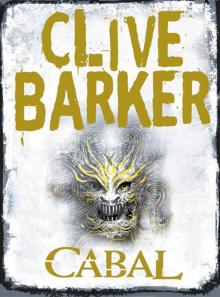 Cabal
Cabal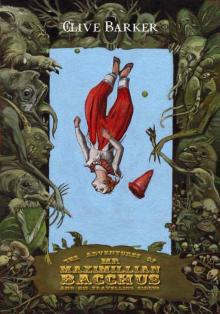 The Adventures of Mr. Maximillian Bacchus and His Travelling Circus
The Adventures of Mr. Maximillian Bacchus and His Travelling Circus Everville
Everville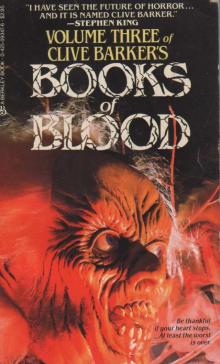 Books of Blood: Volume Three
Books of Blood: Volume Three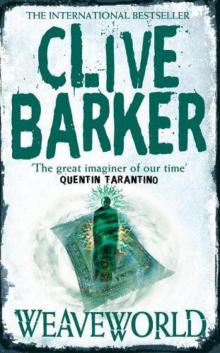 Weaveworld
Weaveworld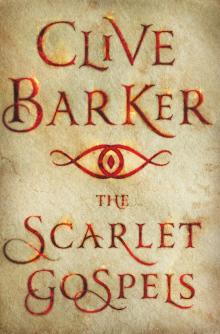 The Scarlet Gospels
The Scarlet Gospels Sacrament
Sacrament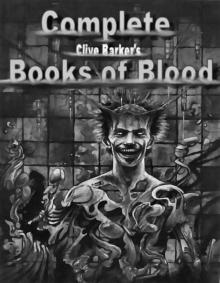 Books of Blood: Volumes 1-6
Books of Blood: Volumes 1-6 Sherlock Holmes and the Servants of Hell
Sherlock Holmes and the Servants of Hell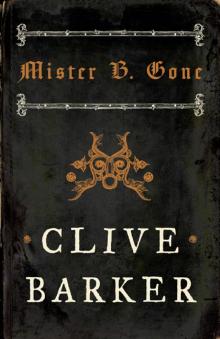 Mister B. Gone
Mister B. Gone Imajica
Imajica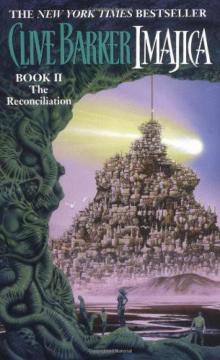 The Reconciliation
The Reconciliation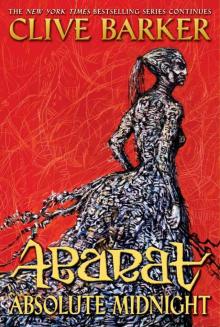 Abarat
Abarat Clive Barker's First Tales
Clive Barker's First Tales The Hellbound Heart
The Hellbound Heart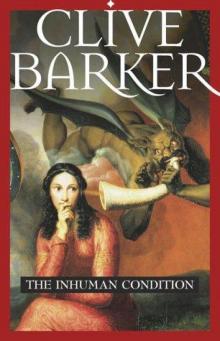 The Inhuman Condition
The Inhuman Condition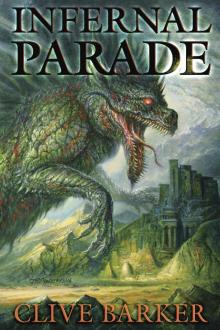 Infernal Parade
Infernal Parade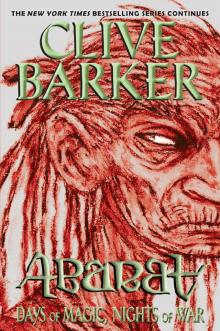 Days of Magic, Nights of War
Days of Magic, Nights of War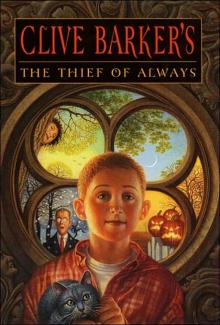 The Thief of Always
The Thief of Always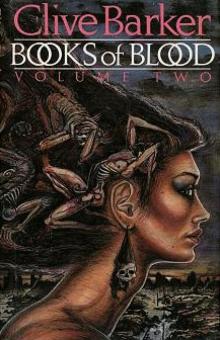 Books of Blood Vol 2
Books of Blood Vol 2 The Essential Clive Barker
The Essential Clive Barker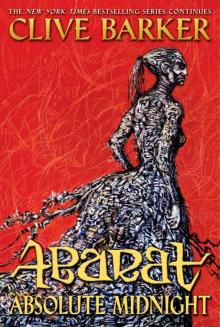 Abarat: Absolute Midnight a-3
Abarat: Absolute Midnight a-3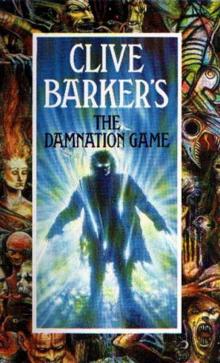 The Damnation Game
The Damnation Game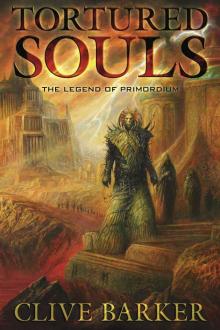 Tortured Souls: The Legend of Primordium
Tortured Souls: The Legend of Primordium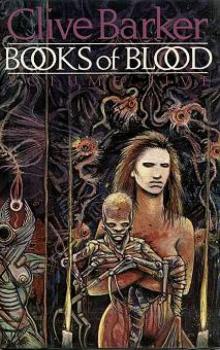 Books of Blood Vol 5
Books of Blood Vol 5 Imajica 02 - The Reconciliator
Imajica 02 - The Reconciliator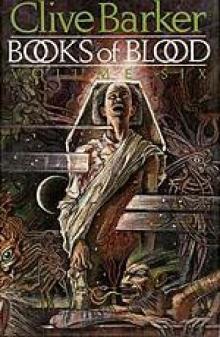 Books Of Blood Vol 6
Books Of Blood Vol 6 Imajica 01 - The Fifth Dominion
Imajica 01 - The Fifth Dominion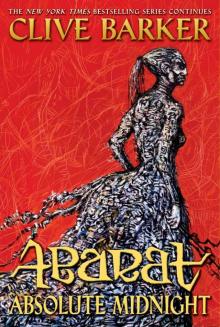 Abarat: Absolute Midnight
Abarat: Absolute Midnight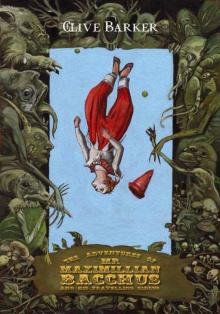 The Adventures of Mr. Maximillian Bacchus & His Traveling Circus
The Adventures of Mr. Maximillian Bacchus & His Traveling Circus Tonight, Again
Tonight, Again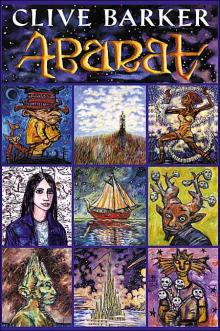 Abarat: The First Book of Hours a-1
Abarat: The First Book of Hours a-1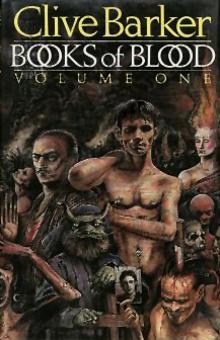 Books Of Blood Vol 1
Books Of Blood Vol 1 Age of Desire
Age of Desire Imajica: Annotated Edition
Imajica: Annotated Edition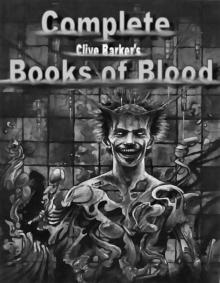 Complete Books of Blood
Complete Books of Blood Gutted: Beautiful Horror Stories
Gutted: Beautiful Horror Stories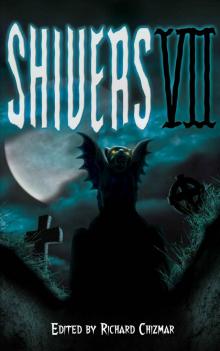 Shivers 7
Shivers 7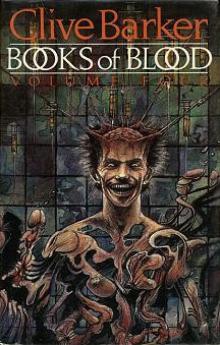 Books Of Blood Vol 4
Books Of Blood Vol 4